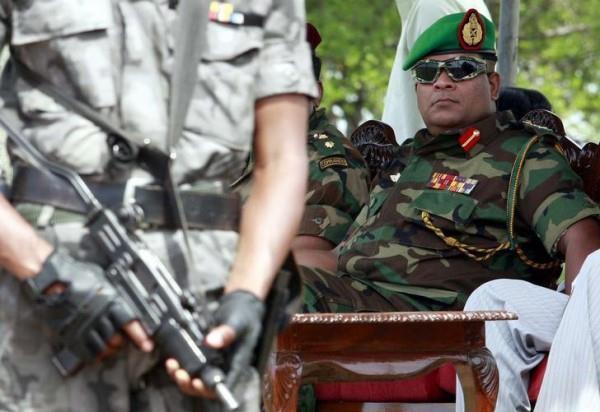Image: General Shavendra Silva is seen at the Ampara Air Force camp in eastern Sri Lanka August 24, 2009. © 2009 Reuters/Stringer/Files.
Meenakshi Ganguly, South Asia Director, HRW.
Sri Lanka’s President Maithripala Sirisena has appointed a general whose forces have been credibly accused of war crimes as the commander of the national army. The move would seem to confirm the fears of those like Finance Minister Mangala Samaraweera, who, back in March, supported the United Nations Human Rights Council’s extension of its 2015 resolution on Sri Lanka.
The extension, which Sirisena and other top officials openly opposed, seeks justice and accountability for violations committed during the 26-year civil war that ended in 2009. “The sad reality is, then, that there are those who oppose any measure to achieve accountability and reconciliation, because they don’t want justice,” said Mangala Samaraweera.
“They want victor’s justice.”
The appointment of Major General Shavendra Silva as army commander suggests he was right. The Office of the United Nations High Commissioner for Human Rights Investigation on Sri Lankadocumented laws of war violations committed by the Silva-led 58th Division in the conflict that could amount to war crimes.
Silva’s own website described himself as a “hero” for his role in the defeat of the separatist Liberation Tigers of Tamil Eelam. But in 2012, while he was Sri Lanka’s deputy ambassador to the UN, he was removed from the UN Special Advisory Group on Peace Keeping Operations due to the allegations against him. Silva has also been accused of human rights violations during security operations in southern Sri Lankaagainst the Sinhalese nationalist Janatha Vimukthi Peramuna (JVP) armed group in the late 1980s.
The UN human rights investigation recommended that Sri Lanka engage in vetting “to remove alleged perpetrators” from the military. But instead of investigating Silva, the government has rewarded him with promotions. Michelle Bachelet, UN high commissioner for human rights, stated that she was “deeply troubled” by the appointment.
For the relatives of victims of abuses committed by Silva’s 58th Division – who have long held vigils seeking justice and answers – this appointment negates all the government’s pledges toward accountability, reconciliation, and reform. Even so, the government still has international commitments. It should immediately set up a justice tribunal with international participation – or the UN Human Rights Council should step in and do so instead.
